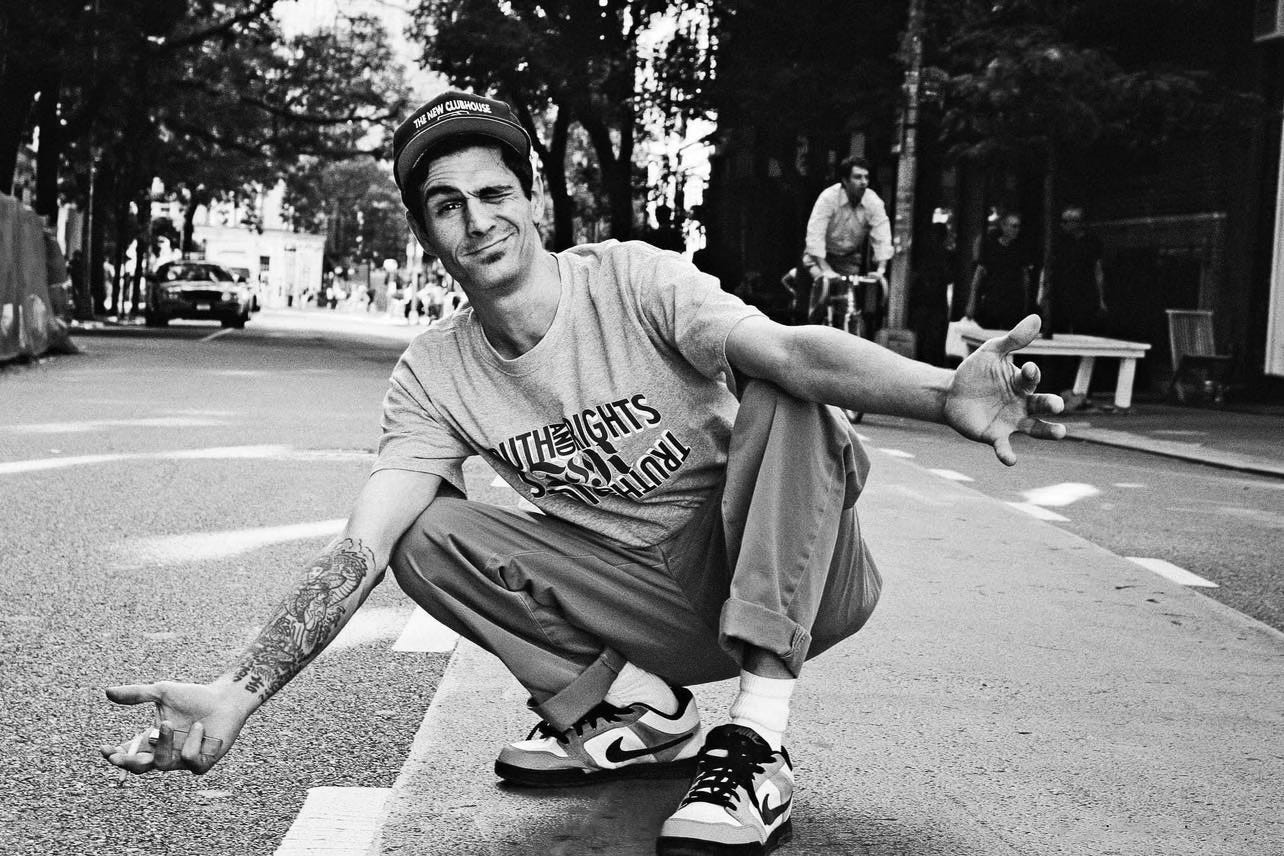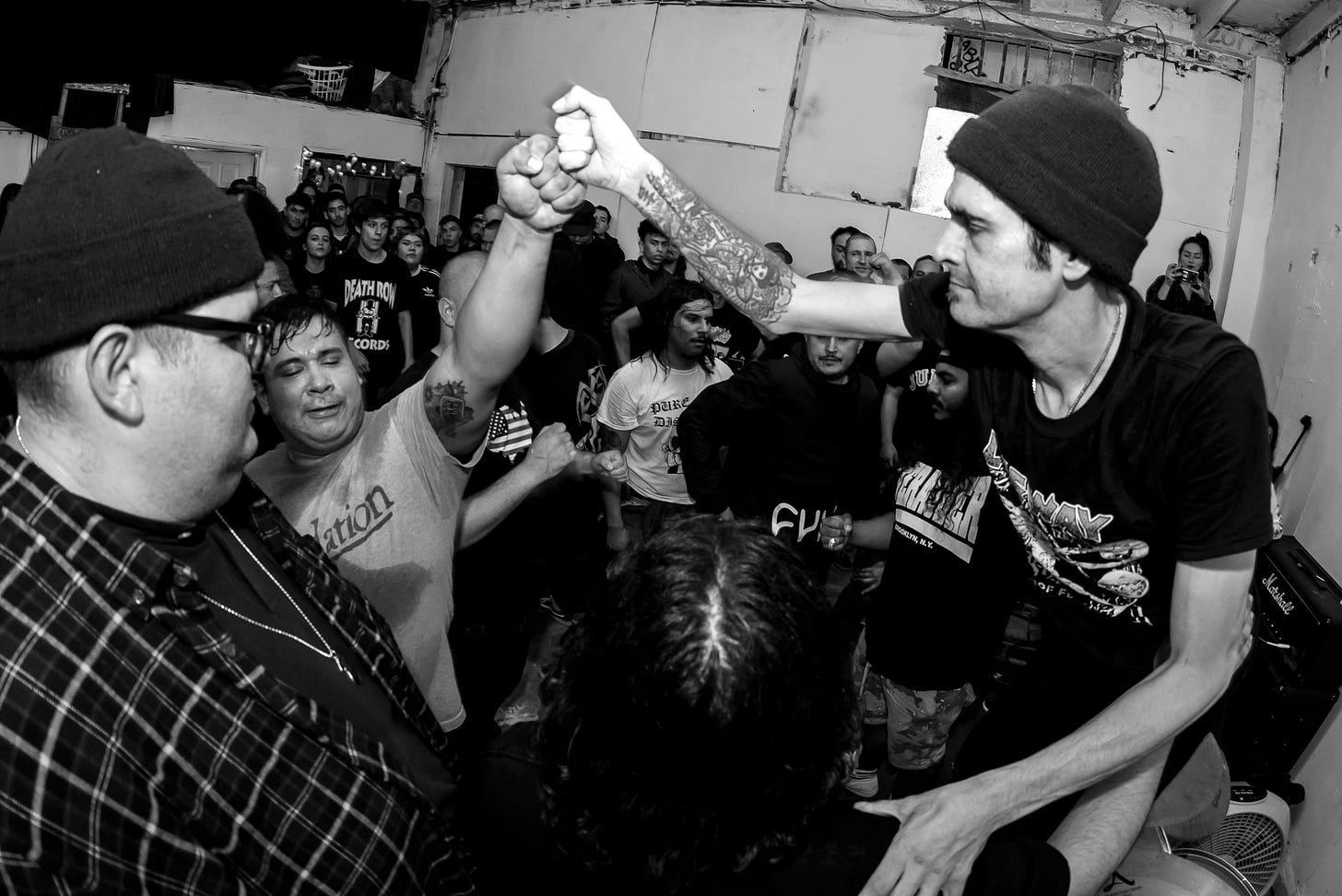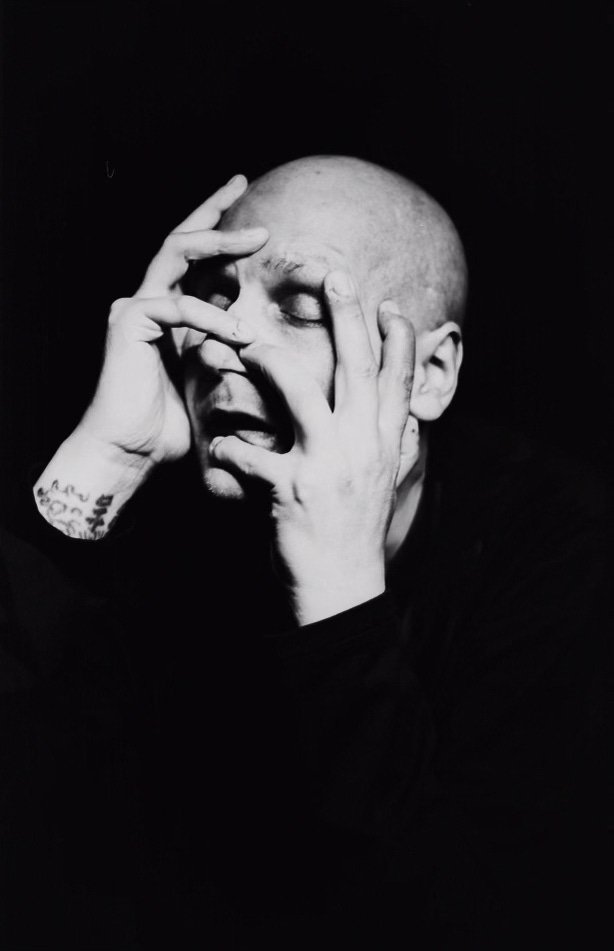Keep Fighting For Your Life
Eddie Leeway spent his final years with two feet planted firmly inside the hardcore community he loved. He left us with more than just the music.

I.
If I’m being honest, I felt somewhat apprehensive before Thursday played This Is Hardcore in 2022. For as long as I’ve been playing left-of-center post-hardcore at so-called “traditional” hardcore shows—going on 33 years and counting—there’s still almost always a part of me that gets inside of my own head about it. It’s that age-old insecurity: What if we’re not hardcore enough? That’s nonsense, of course. We were invited to headline the final night of the festival by a man whose name is literally Joe Hardcore. And between the five of us, we’ve been cumulatively a part of the hardcore scene for well over a hundred years. This is our home.
There were a lot of great bands playing with us that Sunday in Philadelphia, but as I remember it, Leeway was the only band whose set time I memorized. It had been only a year since Eddie Sutton, the band’s legendary singer, had been diagnosed with adenocarcinoma—a condition he described as a very “spreadable form of cancer”—and we knew he’d already been receiving aggressive treatment for it. So while one part of me wanted to see Leeway because they are one of the most formative bands of my early hardcore years and I still love them, the other, more human part of me just wanted to make sure Eddie was OK.
When Eddie Leeway walked on stage that afternoon, it was impossible to ignore that he looked physically weak; his body appeared to be ravaged by treatment. At the same time, there was an unmistakable will in his demeanor. The substance of Eddie’s swag had morphed from the “hard to beat” street kid that many of us tried to emulate in the ‘80s into the defiant mien of a 57-year-old man determined to beat cancer—or at least live his life like he was going to. Eddie stood tall when he had to and crouched low when he needed to, but at no point during their set did he ever give any less than his 100 percent. I watched him perform with an awe and reverence, much as I did when I was a fifteen-year-old kid seeing Leeway open for the Bad Brains in 1989, but this time for completely new reasons.
One specific part of the set made me unexpectedly emotional. Eddie was huddled on the stage, with Joe Hardcore standing to his left, when he began to speak with a palpable sense of gratitude and urgency. His words had an elegiac quality.
“I’m so lucky and privileged to be here tonight, you have no idea,” Eddie said, enunciating the point. “And without you folks coming back every year to This Is Hardcore and this beautiful thing Joe does, what would we have? We wouldn’t have this love, we wouldn’t have this respect, we wouldn’t have this community—which is unity. And I’m honored and flattered and humbled to be a part of that.” He paused, and then on a sincere note that verged on sadness, added, “Shit, at least I got something right in my life.”

II.
Whenever someone of any significance from the hardcore scene dies, it can feel like a reminder that the inevitable march of time comes for all of us. In the first 20 years of hardcore, death was rare enough to be shocking, and that was largely because—as a scene and as individuals—we were still so young. It was difficult to accept that Raybeez from Warzone could die in 1997 at the age of 35; it somehow made even less sense when Ink & Dagger’s Sean McCabe died in 2000 at only 27. Or at least, it made less sense for me: Although I knew both of them, I always connected with Raybeez as an “old school” figure, not a peer. Sean was someone I felt like I grew up with, though. We were from the same generation of hardcore. We were basically the same age. When Sean died, I felt acutely mortal.
These days, it feels like we are losing members of our community at a more regular clip. I suspect that rate will get faster as the years go on. The earliest generation of hardcore kids—people like Ian MacKaye, Kevin Seconds, Keith Morris, John Brannon, and Vinnie Stigma—are in their sixties now. The next generation—people like Ray Cappo, Jimmy G, Armand Majidi, Chaka Malik, and Walter Schreifels—are well in their fifties. All of these folks are still active and thriving, and that’s maybe a testament to the hardcore fountain of youth. But not everyone will be so lucky.
Whenever I think about Eddie Leeway, I think about a vibrant soul who struggled with notoriety, with addiction, and even, as he often mentioned in interviews, with his own mortality. Those of us who have aged in public inside of the hardcore scene, navigating varying levels of success and failure with our bands or other projects, were particularly able to see ourselves reflected in the kind of future-anxiety that Eddie was already beginning to acknowledge ten years ago, shortly before he turned 50. It’s the kind of anxiety that comes with realizing that preparation for the future is not necessarily prediction.
“I was lucky to survive opiate addiction,” he said in 2014. “I wanted to make music my career, but it didn’t happen that way. I was just being a 40-something-year-old kid. I could still get by and that’s all that mattered to me for a long time. But now I’d like to have something to retire on. I’m getting ready to go back to school. I feel lucky to not only still be on the planet, but to have all my [faculties]. It would be very easy for me to be a 49-year-old kid now, but I was lucky to grow up, get my shit together, and slowly get myself on track while living a very quiet life.”
Of course, Eddie Leeway never gave up on hardcore. Even well before his cancer diagnosis, there was a growing sense that—with the idea of a career in music now off the table—he could finally look back on his life and reassess the value of his work with fondness and clarity.
“I feel like music is the only thing I’ve really done right in my life,” he told No Echo in 2018, evoking the same sentiment he shared at This Is Hardcore in 2022. “It’s why I’m doing everything I can to give back to it for all that I’ve received from it.”

III.
I am turning 50 in three months. “Halfway to a hundred,” as my friend Jonah likes to say, in a description that is almost cruel with precision. I don’t know what to make of this.
In so many ways, my life today is unimaginable. Whenever I meet new people and they ask what I do for a living, it feels weird to say, “I play in a band and I write a fanzine.” But that’s actually what I do. The last time I played in a band and published a fanzine for a living, I was 21. On some level, it makes me wonder if I just completely missed the bus on professional growth. But then I have to remind myself that I’m also kind of living the life that my younger self would have dreamed about. I play in a band and I write a fanzine—at my age. That’s actually kind of stunning.
A few weeks ago, before we learned of Eddie’s passing on April 19, I got into a conversation with Frank Turner, the English singer-songwriter whose career started in the London-based hardcore band Million Dead and who has since gone on to headline Wembley Arena as a solo artist and even have an unlikely UK number-one album in 2022. As he prepares to release Undefeated, his new record due next week, we found our talk returning to what I would consider the album’s primary question: How can we reconcile the inevitability of aging with the forever-youngness of punk?
At 42 years old, Frank laughs, “I am still a punk and still a touring person. I fucking did it!” But he also recalls the moment when his wife gave him the gift of perspective. “She lost her dad when she was quite young in sort of quite dramatic circumstances, which has been a huge event in her life,” Frank tells me, in a conversation that will be published in full on Thursday. “So she often says, ‘Older is what you get if you’re lucky.’ Or to put it in other words, sure, you’re turning 40 or 50 or whatever, but it’s better than the alternative. Because there is only one other alternative, which is not turning 50. And if one is forced to choose between the two, I’ll choose still being here no matter how creaky my muscular skeletal system gets.”
In the context of the past few days, and thinking about this tragic loss for the hardcore community, Frank’s wife may have inadvertently added a new dimension to the way we might all want to look at aging punks and hardcore kids in our community. Which is to say that the fact that I’m turning 50 shouldn’t so much distress me as it should delight me. Instead of mourning the loss of our youth, we should be celebrating our continued survival. Older is what you get if you’re lucky. When Eddie Leeway began his This Is Hardcore speech by saying, “I’m so lucky and privileged to be here tonight,” he knew this.
IV.
Eddie was probably improvising when he spoke that day in Philadelphia, but he nailed it. He essentially told us the secret, the most important thing he gleaned from his 40-plus years in the hardcore scene. It had nothing to do with chest-beating or stage-diving. It had nothing to do with what’s in your closet or even what’s in your record collection. Hardcore isn’t “simply about three-chord thrash and mosh parts,” he once argued, adding, “To me, Billie Holiday was hardcore.” The ties that bind us, the ideals he really wanted us to hold onto, were more fundamental than that. I will always remember the last time I saw Eddie Leeway as the day he spelled it out for all of us: Love. Respect. Community. Unity.
Without them, he told us, we have nothing.
Coming on Thursday to Anti-Matter: A conversation with Frank Turner.
Anti-Matter is reader-supported. If you’ve valued reading this, please consider becoming a paid subscriber and backing independent, ad-free hardcore media. Your support is crucial to Anti-Matter’s continuation and growth. Thank you, friends. ✨





You have such a gift for curating the essence of experiences and life lessons of this absolutely infinite hardcore community. I love so much that Eddie’s words will reverberate here in this essential archive. Thank-you for my weekly self-reflection tool…more than a fanzine!
I'm going to be 54 in a couple of months, and the phrase that's always stuck with me is that I have more life behind me than ahead of me now. It's sobering, but I feel like I'm in a pretty good place. Hardcore meant a lot to Eddie, clearly, and it's the kind of community not everyone gets. And Eddie meant a lot to a lot of people - he touched a lot of lives, and I hope some part of him realized that before he passed. Not everyone gets that either.